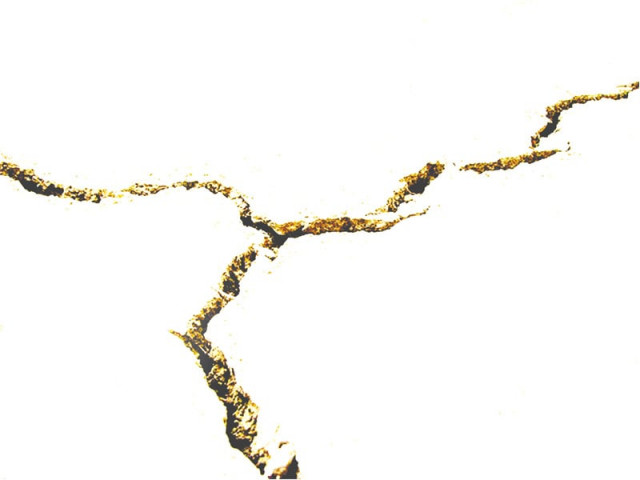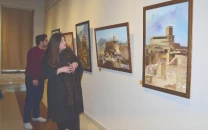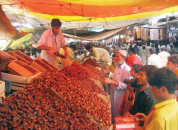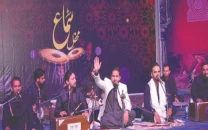Inside Khyber Agency - I: The jirga system and its discontents
Centuries-old feuds are still decided by tribal councils, as the new generation expresses unease.

Fahim Afridi jokes that he feels safe walking around because his enemies “killed two of our family members, so now it’s our turn.”
The family feud has lasted 15 years, but the other side are “in hiding now”, leaving Fahim to stroll freely around Jamrud, a subdivision of Khyber Agency.
Fahim, who grew up in Jamrud, gives a tour around his neighbourhood. He points at a piece of ‘disputed land’ in front of his house, with rocks demarcating ownership. According to Fahim, his family had a dispute with extended family members, but there is no compromise when it comes to ownership of property. He says his enemies felt jealous about his family’s progress – and to retain influence would go to any length.
“It is hooliganism here,” says Fahim’s father, Haji Noor Mohammad, who has lived in Jamrud his whole life. “Whoever has more terror takes the land under his control, and then others who claim rights over it try to fight it out. And men get murdered all the time to achieve such objectives.”
Noor’s own father was murdered in a property dispute in the 1970s. He says things have hardly changed. Even though his father’s murder was resolved later by a jirga (council of elders), new enmities keep on surfacing.
Being an elder in his area, Noor is a jirga member. Jirgas are usually convened when things become too violent between two families. “Nobody agrees to any documentation. It is the code of honour that everyone abides by, but there are always those who are greedy. That is when things go out of control,” he adds.
In anticipation of things getting out of hand, local warlords prepare in advance. Driving into this lawless area, governed by the local tribes themselves, one sees houses constructed to resemble castles, with shooting posts on each corner. These posts, known as ‘toray’ in the local language, have small peeping holes in them which are used for guns. Usually the enemy is in a ‘castle’ constructed in a similar fashion, sometimes as close as across the road. Also, there are caches of weapons hidden in these toray.
“Tribes in Fata have all sort of weapons, including anti-aircraft guns and high-tech weaponry now,” says Haji Yousaf, another tribal elder from Khyber Agency. “After the Soviet fall, the range and quantity of arms in possession of those in Fata increased significantly and it will last for another two decades,” he adds. Other tribal elders say weapons have also been stolen from Nato containers that passed through Khyber Agency into Afghanistan.
The seventy-year-old tribal chief Yousaf, who is from Bara, a highly troubled part of Khyber, has presided over jirgas not just about property disputes but also monetary settlements and women. “Some enmities last for a hundred years,” he adds, though he still believes the tribal justice system is better.
Yousaf’s son, Shakil Afridi, has a different view: he left the tribal way of life and settled in Peshawar more than two decades ago. He thinks the jirga system creates an imbalance. “It’s not a perfect system,” he says.
But the system endures in Khyber Agency and other areas of Fata, since all civil and criminal cases in the area are decided under the Frontier Crimes Regulation 1901 by a jirga. The FCR is a set of laws that are applicable to Fata exclusively and many Pakistani constitutional rights do not apply to residents of Fata.
According to analysts, due to the absence of a judicial system and no separation of the judicial, executive and legislative strands of power, too much power has been vested in government-organised jirgas that have also contributed to problems like the rise of militancy in the area.
“It is the existence of a corrupt jirga system which the government backed in Fata that led to the vacuum being filled by militant organisations like Lashkar-e-Islam,” says local social development worker, Khalil Afridi, who lives in Landi Kotal, near the Torkham border of Pakistan and Afghanistan.
But challenging the government status quo has led to a civil conflict in the area and it has engaged the Pakistan military for the last three years in Khyber Agency. He feels that this confrontation has led to thousands being displaced from Khyber Agency, while those who have stayed back allegedly disappear since they are usually accused either of supporting the military or militancy.
Because of this rising trend, locals warn of a new kind of bloodshed in the coming days. “Ever since 9/11, things have changed in the tribal belt and there are now new kinds of enmities, since tribes have taken different sides in the war in Afghanistan,” says Yousaf, who also feels that after the exit of Nato forces from the area, there will be complete chaos in Fata.
Despite the foresight, Yousaf and other tribal elders of Khyber Agency still feel the centuries-old system of jirga can solve their problems, if the Pakistani authorities do not interfere.
Published in The Express Tribune, March 19th, 2012.



















COMMENTS
Comments are moderated and generally will be posted if they are on-topic and not abusive.
For more information, please see our Comments FAQ